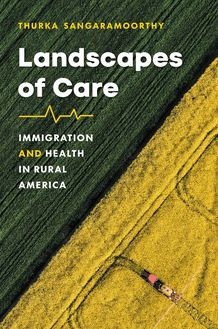Landscapes of Care , livre ebook
92
pages
English
Ebooks
2023
Vous pourrez modifier la taille du texte de cet ouvrage
Obtenez un accès à la bibliothèque pour le consulter en ligne En savoir plus
Découvre YouScribe en t'inscrivant gratuitement
Découvre YouScribe en t'inscrivant gratuitement
92
pages
English
Ebooks
2023
Vous pourrez modifier la taille du texte de cet ouvrage
Obtenez un accès à la bibliothèque pour le consulter en ligne En savoir plus
Publié par
Date de parution
25 avril 2023
Nombre de lectures
2
EAN13
9781469674186
Langue
English
Poids de l'ouvrage
9 Mo
This insightful work on rural health in the United States examines the ways immigrants, mainly from Latin America and the Caribbean, navigate the health care system in the United States. Since 1990, immigration to the United States has risen sharply, and rural areas have seen the highest increases. Thurka Sangaramoorthy reveals that that the corporatization of health care delivery and immigration policies are deeply connected in rural America. Drawing from fieldwork that centers on Maryland’s sparsely populated Eastern Shore, Sangaramoorthy shows how longstanding issues of precarity among rural health systems along with the exclusionary logics of immigration have mutually fashioned a “landscape of care” in which shared conditions of physical suffering and emotional anxiety among immigrants and rural residents generate powerful forms of regional vitality and social inclusion. Sangaramoorthy connects the Eastern Shore and its immigrant populations to many other places around the world that are struggling with the challenges of global migration, rural precarity, and health governance. Her extensive ethnographic and policy research shows the personal stories behind health inequity data and helps to give readers a human entry point into the enormous challenges of immigration and rural health.
Publié par
Date de parution
25 avril 2023
Nombre de lectures
2
EAN13
9781469674186
Langue
English
Poids de l'ouvrage
9 Mo
Landscapes of Care
STUDIES IN SOCIAL MEDICINE
Allan M. Brandt, Larry R. Churchill, and Jonathan Oberlander, editors
This series publishes books at the intersection of medicine, health, and society that further our understanding of how medicine and society shape one another historically, politically, and ethically. The series is grounded in the convictions that medicine is a social science, that medicine is humanistic and cultural as well as biological, and that it should be studied as a social, political, ethical, and economic force.
A complete list of books published in Studies in Social Medicine is available at https:// uncpress .org /series /studies -social -medicine .
Landscapes of Care
Immigration and Health in Rural America
Thurka Sangaramoorthy
The University of North Carolina Press CHAPEL HILL
We are proud to announce that this book is freely available in an open-access edition thanks to TOME (Toward an Open Monograph Ecosystem)—a collaboration of the Association of American Universities, the Association of University Presses, and the Association of Research Libraries—and the generous support of the University of Maryland. Learn more at the TOME website: openmonographs.org .
© 2023 Thurka Sangaramoorthy
All rights reserved
Set in Merope Basic by Westchester Publishing Services
Manufactured in the United States of America
Library of Congress Cataloging-in-Publication Data
Names: Sangaramoorthy, Thurka, 1975– author.
Title: Landscapes of care : immigration and health in rural America / Thurka Sangaramoorthy.
Other titles: Studies in social medicine.
Description: Chapel Hill : The University of North Carolina Press, [2023] | Series: Studies in social medicine | Includes bibliographical references and index.
Identifiers: LCCN 2022053982 | ISBN 9781469674162 (cloth) | ISBN 9781469674179 (paperback) | ISBN 9781469674186 (ebook)
Subjects: LCSH : Immigrants—Medical care—United States. | Rural health services— United States.
Classification: LCC RA 448.5. I 44 S 264 2023 | DDC 362.1/042570973—dc23/eng/20221114
LC record available at https:// lccn .loc .gov /2022053982
Cover illustration: Aerial view of field © shutterstock.com/Mariusz Szczygiel.
To Gyan and Ashok for inspiring me to focus on the story that I wanted to tell, and to all those on Maryland’s Eastern Shore who generously taught me about the intimate connections between immigration and rural health
Contents List of Illustrations Preface Writing Immigration: Love, Loss, and Longing Introduction The Land That Time Forgot CHAPTER ONE Journeys through the Heartland Rural America as the “New” Receiving Destination CHAPTER TWO Ordinary Living Everyday Injury, Disability, and Instability CHAPTER THREE Place, Personhood, and Precarity Rural Dynamics of Health Care CHAPTER FOUR Band-Aid Care Small Fixes and Gaping Wounds CHAPTER FIVE On Hope and Indeterminacy Acknowledgments Notes Bibliography Index
Illustrations
FIGURES
0.1 Crabs 2
0.2 Mobile clinic 7
1.1 Cumulative growth in the foreign-born population, new- and traditional-destination states, 1960–2019 27
1.2 Loading Stringbeans for Packinghouse near Cambridge: 1937 30
2.1 Billboard advertising poultry processing jobs 51
2.2 Watermelon harvest 58
2.3 Women picking crab 65
3.1 Clinic waiting room 78
3.2 Handwashing instructions in Haitian Krey ò l 86
4.1 Medical provider using a nebulizer during a mobile health clinic visit 95
4.2 Charity thrift store 106
5.1 American and Mexican flags displayed in front of a commercial crab processing plant 118
5.2 Local community organization sign 124
MAP
0.1 Maryland’s Eastern Shore 4
TABLE
1.1 Number and share of foreign born in new- and traditional-destination states, 1960–2019 27
Preface
Writing Immigration : Love, Loss, and Longing
I am an immigrant, a refugee forced to leave the only home I had ever known at the tender age of seven. My parents fled war-torn Sri Lanka in 1983 after my mother issued an ultimatum to my father: we leave together as a family, or she would go alone with her two young daughters. Weeks after the deadly riots in July 1983—commonly referred to as Black July , 1 the anti-Tamil pogrom that resulted in the death of potentially 3,000 Tamils and sparked the twenty-five-year civil war—the four of us met my mother’s relatives in the United States. We narrowly escaped, carrying only two small suitcases and the clothes on our backs.
Although I was young when we left Sri Lanka, I have clear memories that remain. In my small village neighborhood, I remember an army checkpoint at the end of the main road. My friends and I used to play and ride our bikes down that road. We had to cross the checkpoint to get to stores, schools, and other homes. I remember being told by my parents how to behave near the checkpoint: walk straight and slow, do not make sudden movements, and if confronted by any uniformed officer, answer all questions and obey orders no matter what. This wariness became part of my muscle memory. Forty years later, my body still automatically tenses up around uniformed police and military. 2
In the United States, I followed the Sri Lankan Civil War through stories from relatives, family friends, and the media. I heard accounts of forced disappearances, torture, and rape. I saw pictures of dead bodies, shelled homes, and flattened villages. My reactions to these stories and photographs have always been dissociative, mainly because I do not feel an intimate connection to a place that I have never been able to return to and do not have close family members who remain. I also felt alienated and traumatized by the harmful, enduring equations between Sri Lankan Tamils and death, violence, and terrorism.
At the same time, I have never felt like I belong in my adopted home, either. Growing up poor and Brown in America is not easy. I continue to experience challenges related to racism, discrimination, and being treated differently, even though the circumstances of my life have shifted drastically since my arrival. These feelings of not belonging either here or there, rootlessness, and always longing for a home that no longer exists—and perhaps, in some ways, never existed—have been with me since I was a child. But there are also moments of celebration, hope, and resoluteness, of finding community and engaging in the radical politics of being and caring, despite the challenges.
These are the perspectives I rarely see in academic books on immigration. Yet this is the intimate familiarity from which I am able to write. I am a Sri Lankan Tamil immigrant scholar from a working-class background in the United States and the first in my family to attend college. Still, others see me as what Leisy Abrego calls “out-of-place” among scholars of immigration in anthropology. 3 As a first-generation immigrant, I was expected to work on South Asia or South Asian diaspora issues. I never once witnessed my white colleagues subjected to the same expectations of working in their own communities. Instead, they were encouraged to work on issues affecting minoritized and vulnerable people, often in faraway or “exotic” locales. Even when I had opportunities to work on projects that focused on the experiences and perspectives of poor South Asian immigrants living in New York City, research advisers constantly questioned my ability to conduct rigorous, objective, “unbiased” research among “my own.” Others’ discouragement and my incapacity to reckon with my own historical trauma of coloniality, war, and terror made me hesitant to work with Sri Lankan Tamil communities, especially in the realm of health and well-being.
AS A GRADUATE STUDENT IN PUBLIC HEALTH, I learned of the discrimination toward Haitians while working on a longitudinal study of those living with HIV. I spent time listening to Haitian immigrants’ narratives of life in Haiti and the United States. I realized how much we had in common as we shared memories of extraordinary yet routine political violence back home and exchanged stories of personal experiences of economic insecurity and racism. Through the research encounter, we co-performed pain and suffering, seeing the unseen and hearing the unspoken, moving perhaps toward what Naisargi Dave calls “the subject of intimacy and away from the self and its protective skin.” 4 These modes of witnessing and accompaniment engendered an unwavering commitment to a moral praxis rooted in solidarity, empathy, and understanding. 5
I continued to work with Haitian immigrants as a PhD student, exploring the biopolitics of HIV prevention policies and programs and their effect on the health and well-being of transnational communities. Unfortunately, a military coup prevented me from continuing my dissertation fieldwork in Haiti. As a result, I constantly worried about the safety and welfare of friends, colleagues, and interlocutors while pivoting my research to focus on Haitian communities in South Florida. During this time, white colleagues openly remarked that my U.S.-based fieldwork was “easy” and “uncomplicated” compared to theirs in more “global” settings without reflecting how such assumptions are pervasive within anthropology, a discipline rooted in imperialism and white supremacy.
As I began to publish the findings from my dissertation, I felt increasingly disillusioned with the academic inclination to focus exclusively on immigrant vulnerability and suffering and, in the case of Haitians, Black death and deficiency. A reviewer for my first book, for instance, rejected it based on a lack of “thick ethnographic description” about stigma, suffering, and blame, claiming that many Haitian interlocutors could not be considered immigrants at all without these signifiers. In working alongside others, I had witnessed and lived otherwise—in joy and despair, resistance and fear, care and abandonment. Such moments of bein



